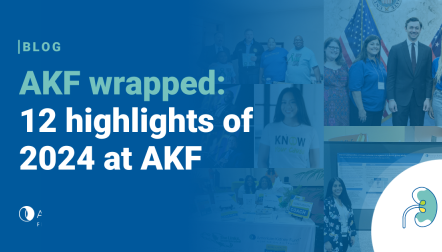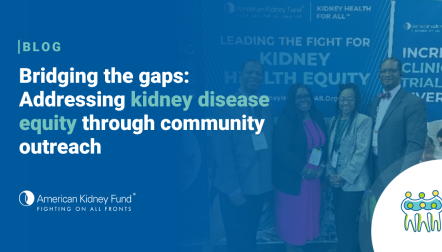
Blog post
Q&A with Dr. Velma Scantlebury-White, the first Black female transplant surgeon in the U.S.

In honor of Black History Month, the American Kidney Fund (AKF) is celebrating a trailblazer, mentor and advocate in the kidney transplant world: Dr. Velma Scantlebury-White.
Dr. Scantlebury-White is a Barbadian-born American transplant surgeon. She was the first Black woman transplant surgeon in the United States. She has received many honors in her career, including the Order of Barbados Gold Crown of Merit and the National Kidney Foundation's Gift of Life award. She has also been recognized on the "Best Doctors in America" and "Top Doctors in America" lists multiple times. Currently, she is the Chief Medical Officer and Co-Founder of the Delaware Health Equity Coalition Inc., a non-profit organization delivering comprehensive integrated healthcare to the underserved communities of Wilmington, Delaware. She is also an Adjunct Professor of Surgery at the Giesel School of Medicine at Dartmouth College and co-leader for the Race and Health Equity (RHE) Curriculum. Dr. Scantlebury-White also serves as a medical consultant for Dialysis Patient Citizens Education Center.
Dr. Scantlebury-White is passionate about educating communities of color about the need for more organ donors and the rising number of patients in need of transplantation. As a board member of the National MOTTEP (Minority Organ and Tissue Transplant Educational Program) and a member of the AKF's Health Equity Coalition, she continues to promote education regarding the higher incidence of kidney failure within the Black community.
Get to know more about Dr. Scantlebury-White in this Q&A.
How did you become interested in a career in medicine?
As a young child I had an older sister who died [and] after her death, I felt that although I could not help her, by becoming a doctor I might be able to save the lives of many others.
What made you want to become a transplant surgeon?
The first female surgery attending [I met] was a pediatric surgeon and I wanted to be just like her. My training [also] required two years of research, which exposed me to transplantation research. I was drawn to transplantation and switched my focus to pediatric transplantation instead.
What has it meant to you to be the first Black female transplant surgeon?
It certainly was not an easy journey, and I was not aware that I was the first…It was a realization that I later discovered as I searched for others like me and learned [from other transplant surgeons] that there were none.
Being the first has given me the opportunity to lead and encourage others, who may feel that it is not possible that it can be done, despite the obstacles and challenges they will face along the way.
Why do you think there were no Black female transplant surgeons before you and what can be done to encourage more women of color into this field?
Women in surgical subspecialties was not a common occurrence, and in fact, there were very few women in surgery outside of my residency at that time in New York. When I arrived in Pittsburgh for my transplantation fellowship, there were no women in the department of surgery. Without mentors or others to encourage women in surgery, many saw surgery as not within their capability, since it was rare to encounter any female surgeons, and less likely a Black female surgeon.
As we now have more Black female surgeons, it is important for us to be mentors, and use our knowledge and expertise to encourage others who are interested in pursuing a career in surgery.
What are some highlights or milestones from your career as a transplant surgeon that stand out to you or that you are most proud of?
I am most grateful to play a role in the lives of so many patients that I had an opportunity to change their lives though transplantation. It is very rewarding to be contacted by a patient from 20 or 30 years ago, who is doing well, and took the time to look me up on the internet, just to reach out to make contact.
There are so many patients that I will always remember, and some of them I have mentioned in my book, "Beyond Every Wall – Becoming the First Black Female Transplant Surgeon."
[Also, in] 2002, I relocated to Mobile, Alabama to re-launch a transplant program after it had to pause after the death of the program director. This was an area with tremendously high rates of end-stage kidney disease and the only other transplant program was about four hours away. With community education and advocacy, the transplant program in Mobile was able to provide transplantation for those in need right at home, without the need to travel four hours away. The success of the program brought many patients from the western portion of Florida to be transplanted in Mobile. I am grateful for the opportunity to make a difference in that city at a time of need.
What changes did you see in the field from the time you started to now? What changes do you think still need to be made?
We certainly have more women in transplantation surgery and a rising number of Black female surgeons. There have also been incredible advances in immunosuppressive medications since my years as a fellow in transplantation surgery. The changes in kidney allocation have also allowed many patients who sat on dialysis for many years to get transplanted sooner by having their years on dialysis count toward their transplant wait time.
However, we still see disparities in kidney transplantation despite all the policy changes, and African Americans still have lower rates of living kidney donation compared to white people.
What are the biggest challenges facing the transplant medical field today?
First: Not enough donor organs. While we continue to do more transplants each year, there are still not enough available organs for those awaiting such lifesaving organs. Research around the implantable kidney is still ongoing as well as gene-altering pig kidneys into humans, and such innovations would offer hope to the many patients who are unable to receive standard deceased or living donor kidneys.
Second: Chronic rejection. We have many immunosuppression drugs that work well to eliminate acute rejection. However, continuous monitoring of transplanted kidneys is important as chronic underlying scarring from chronic rejection remains an issue. This can lead to loss of the kidney and a need for transplantation. Educating our patients about the need to be adequately monitored is essential as patients get beyond the initial years post-transplant.
Why did you join the American Kidney Fund's Health Equity Coalition?
As a board member of National MOTTEP, it was important for us to be part of the Health Equity Coalition as we continue to identify and eliminate the barriers that Black and brown patients face when navigating the transplant system. It is an honor to work with the many organizations that know the importance of advocacy and education for all patients while providing targeted solutions for better access to health for those with kidney disease.
What advice would you give to any aspiring transplant surgeons, especially for those who are women of color?
It is important to find mentors who can help you navigate the path ahead as there can be many obstacles along the way. However, never doubt your talent and skills, as you may be judged on a different scale from those around you. Believe in yourself and let your determination and grit keep you focused on your goals. Surround yourself with those who believe in you and trust in that higher source of strength.
What is one thing you wish more people understood about kidney disease and/or kidney transplants?
Kidney disease is silent. Get checked annually and if you know that others in your family have kidney disease, it becomes more important to find out if you are at risk. Gain as much knowledge as possible about your disease process and ask questions of your health care provider. Understand your options for treatment and ask yourself: "Is this the best option for me?"
Seek out other sources of information such as the American Kidney Fund that can help in providing you with more resources to navigate your health journey.
Editor's note: answers were edited for clarity and style.





